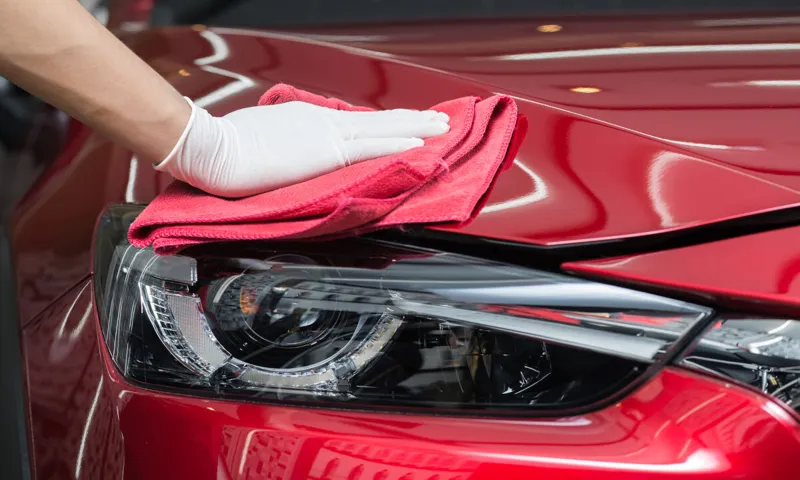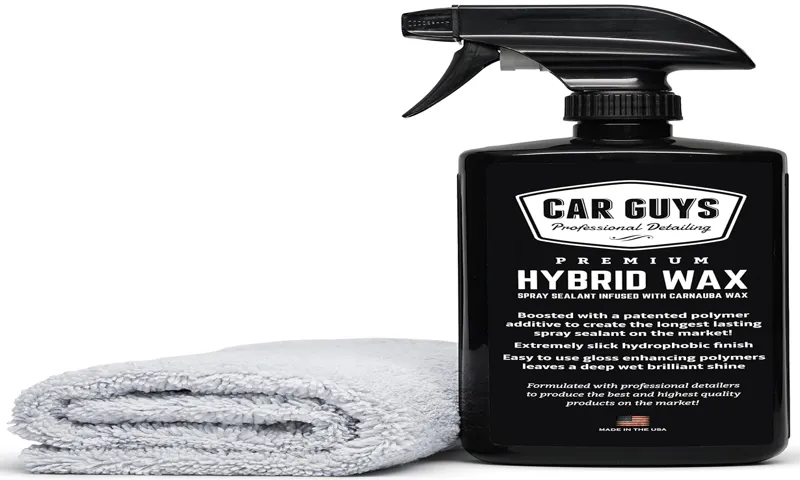If you’re on the hunt for better ways to protect your vehicle, then you’ve likely come across the term “car sealant.” But, what exactly is it? A car sealant is a liquid or spray-on product that forms a protective layer over your car’s paint, helping to shield it from damage. Essentially, it acts as an extra layer of protection against elements such as dirt, debris, UV rays, and even water.
Think of it like a raincoat for your car. Just like how you wouldn’t leave your house without a raincoat on a rainy day, you wouldn’t want to leave your vehicle exposed to the elements without car sealant. Not only does it help keep your car looking shiny and new, but it can also prevent damage that would otherwise be costly to fix.
But, not all car sealants are created equal. Some are made with synthetic polymers, while others use ceramic or wax-based formulas. Each type has its own unique set of benefits, like longer lasting protection or easier application.
It’s important to do your research and find the right sealant for your specific needs. Overall, using a car sealant is a great way to protect your investment and keep your car looking like new. So whether you’re a car enthusiast or just looking to keep your vehicle in top shape, consider giving car sealant a try.
Table of Contents
Definition and Purpose
Car sealants are coatings used to protect the car’s paint against potential damage from environmental factors like UV rays, oxidation, acid rain, and pollutants. These sealants work by forming a protective layer over the paint, creating a barrier between it and the elements that could deteriorate it over time. Unlike car waxes, which require frequent application, sealants can last up to several months, providing long-lasting protection to the car’s exterior.
The primary purpose of car sealants is to maintain the car’s aesthetic appeal by keeping the paint looking brand new for longer periods. Not only do they provide protection, but they also give the car a glossy finish and a smooth texture. Applying a sealant before winter can reduce the damage caused by snow, salt, and other winter-related factors, making it an ideal investment for car owners who want to maintain their car’s value.
In conclusion, car sealants are an essential item for any car owner looking to extend the life of their car’s paint and keep it looking new for years to come.
Car Sealant vs Wax
Car sealant and wax are two products used to protect the paint of a car. Car sealant is a synthetic product made from polymers and resins that form a durable layer of protection over the paint. On the other hand, wax is a natural product made from carnauba or beeswax that acts as a barrier to protect the paint from the elements.
Both products serve the purpose of protecting the car paint, but car sealant is generally considered to be more effective and longer-lasting than wax. Car sealant can protect a car’s paint for up to six months, while wax usually needs to be reapplied every three months. In terms of application, sealant is easier to apply than wax as it does not require buffing and can be applied using a spray or foam applicator.
However, some car enthusiasts prefer using wax as it provides a warm glow and gives the car a classic look. Ultimately, the choice between car sealant and wax comes down to personal preference and desired level of protection for your car’s paint.

Benefits of Car Sealant
Car sealant is a liquid coating applied to cars after washing and polishing to protect the vehicle from environmental damage. The purpose of car sealant is to provide a barrier against UV rays, acid rain, bird droppings, and other environmental pollutants that can harm a car’s paint job. Car sealant can also make the washing process easier by preventing dirt and grime from sticking to the vehicle’s surface.
Applying car sealant can provide many benefits, such as extending the life of a car’s paint job and maintaining its resale value. Additionally, it can reduce the need for frequent waxing and polishing, saving car owners time and money in the long run. When investing in car sealant, it is essential to choose a high-quality product and follow the manufacturer’s instructions carefully.
Using a car sealant regularly can be a simple and effective way to protect one’s car from environmental damage and keep it looking its best.
Types of Car Sealant
If you’re looking to protect your car’s paintwork and enhance its appearance, then you’ve probably heard of car sealants. Put simply, car sealants are a protective coating that shields your car’s exterior from environmental damage like UV rays, dirt, and debris. But did you know that there are different types of sealants? The two most common types are synthetic and natural sealants.
Synthetic sealants are made from man-made polymers and offer superior durability and longevity, whereas natural sealants are made from organic materials like carnauba wax and are known for their warm and deep shine. Another type of sealant is ceramic coating, which creates a hard and glossy layer of protection that can last for years. So, which one is right for you? It depends on your car’s specific needs and your own preferences.
Synthetic sealants are great for busy car owners who want long-lasting protection, while natural sealants are perfect for those who appreciate the traditional, warm shine of carnauba wax. Ceramic coatings are ideal for car enthusiasts who want the ultimate protection and shine for their car. Overall, choosing the right sealant involves considering factors like your lifestyle, how often you drive your car, and what kind of protection you want for your car’s paintwork.
Polymer Sealant
Polymer Sealant When it comes to protecting your car’s paint job, using a high-quality sealant is essential. There are several types of car sealants available, but polymer sealants are among the most durable. These sealants use synthetic polymers to provide a hard, protective shield that can resist UV rays, acid rain, and other environmental contaminants.
Additionally, polymer sealants are easy to apply and can last for several months before needing to be reapplied. However, it’s important to note that not all polymer sealants are created equal. Some brands offer better protection than others, so it’s important to do your research before choosing a sealant for your car.
Look for a sealant that is easy to apply, provides long-lasting protection, and has a high level of gloss to give your car a showroom finish. Overall, investing in a good polymer sealant is a smart choice for anyone looking to keep their car’s paint job in top condition.
Ceramic Sealant
Ceramic Sealant Car sealants are a great way to protect your vehicle’s paint and keep it looking brand new. One popular type of car sealant is ceramic sealant. Ceramic sealants use nanotechnology to fuse with your car’s paint, creating a strong barrier against the elements.
They are incredibly durable and can last for years with proper maintenance. One of the biggest benefits of ceramic sealants is their ability to repel water and prevent dirt and other contaminants from sticking to the paint surface. This is especially important for vehicles that are exposed to harsh weather conditions or heavy use.
Another advantage is that ceramic sealants provide a deep, glossy shine that enhances the overall appearance of the car. Overall, ceramic sealants are a great investment for anyone looking to protect their car’s paint and keep it looking fresh for years to come.
Silane-Siloxane Sealant
Car Sealant Car sealants are essential to protect your vehicle’s exterior and prolong its lifespan. There are different types of car sealants available in the market, and each offers unique benefits. One of the best types is the silane-siloxane sealant.
It is a hybrid sealant that combines the water-repelling properties of silane with the durability of siloxane. Its unique blend provides a long-lasting protective barrier against moisture, UV rays, and other environmental factors that can harm your car’s finish. Silane-siloxane sealants are easy to apply and offer a smooth finish, making them an excellent choice for car owners who want their vehicle to look its best.
They are also versatile and can be applied to various surfaces, including paint, glass, and metals. If you are looking for a reliable car sealant that provides ultimate protection and a glossy finish, consider the silane-siloxane sealant.
How to Apply Car Sealant
If you’re wondering what a car sealant is, it’s a protective coating that you apply to your car’s exterior to keep it looking shiny and new for longer. Car sealants are generally made of synthetic polymers that bond to your car’s paint, creating a layer of protection against environmental factors such as UV rays, dirt, and pollutants. Applying car sealant can be a bit daunting, but with the right tools and technique, it’s a straightforward process that you can easily do at home.
First, make sure your car’s paint is clean and dry, then apply the sealant using a foam applicator pad or a microfiber towel. Work in small sections, making sure to cover the entire surface evenly. After applying the sealant, allow it to cure for the recommended time, then wipe off any excess with a clean microfiber towel.
Using a car sealant can extend the life of your car’s paint job and protect it from harmful elements, so it’s definitely worth the effort.
Preparation
Applying car sealant can be a daunting task, but with the right preparations, you can achieve a shiny and long-lasting finish. First, you need to wash your car thoroughly to get rid of dirt, grime, and contaminants. Use a high-quality car shampoo and a microfiber cloth to avoid scratching the paintwork.
After that, you need to dry the car completely to prevent water spots. Use a blower or chamois for faster and more efficient drying. Next, you need to inspect your car for any scratches, swirl marks, or imperfections.
If you find any, use a clay bar and a detailer to remove them. If you have any wax or polish on the paintwork, you need to strip it off using a pre-wax cleaner. Finally, you need to choose the right sealant for your car.
Make sure you read the label carefully and follow the instructions to the letter. Apply the sealant in a cool and shaded area using an applicator pad or a foam roller. Remember to work in small sections and buff off the excess sealant with a microfiber towel before it dries.
By following these steps, you can apply car sealant like a pro and protect your car’s finish from harsh weather and UV rays.
Application Process
Car sealant application can be a simple and rewarding process, provided you follow a few key steps. Before you begin, ensure that the surface of your car is clean and dry, free from any dirt or debris that may interfere with the sealant’s adhesion. Apply the sealant in small sections, using a foam or microfiber applicator pad and working in straight lines.
Be sure to work quickly, as the sealant may begin to dry and flash if left too long. After application, allow the sealant to cure for at least 24 hours before exposing your vehicle to water or other environmental factors. Applying car sealant not only protects your car’s paint finish, but also provides brilliant shine and lasting durability.
Always choose a high-quality sealant product that suits your car’s needs to ensure optimal performance and longevity.
Conclusion
In conclusion, a car sealant is like a superhero for your vehicle. Just like our caped crusaders, it protects the paintwork from all kinds of harm – whether it’s road debris, UV damage, or bird droppings. But instead of a spandex suit, this hero wears a layer of special chemical compounds that form a seamless barrier on the surface of the car.
So next time you see a shiny, gleaming ride cruising down the street, remember that it’s not just luck or superior genes – it’s the power of a great car sealant!”
FAQs
What is a car sealant?
A car sealant is a coating applied to the exterior of a car to protect it from damage caused by weather, UV rays, scratches, and other environmental factors.
How long does a car sealant last?
The longevity of a car sealant depends on the quality of the product and the maintenance of the car. Generally, it can last from six months up to a year.
Is car sealant better than car wax?
Yes, car sealant is better than car wax because it provides stronger and longer-lasting protection. Car wax tends to wear off quickly compared to a sealant.
Can car sealant be applied by hand or only by machine?
Car sealant can be applied both by hand and machine. However, using a machine will make the application process faster and more efficient.
What are the benefits of using a car sealant?
The benefits of using a car sealant include protection against environmental damage, UV rays, and scratches. It also makes the car easier to clean and maintain its long-lasting shine.
Can car sealant be used on any type of car paint?
Yes, car sealant can be used on any type of car paint, including clear coats, single-stage paint, and ceramic coatings.
How do I apply car sealant?
To apply car sealant, first, make sure the car surface is clean and dry. Apply a small amount of sealant to a foam applicator pad and spread it evenly on the car’s surface. Let it sit for several minutes, then wipe it off with a microfiber towel. Repeat the process on all surfaces.



